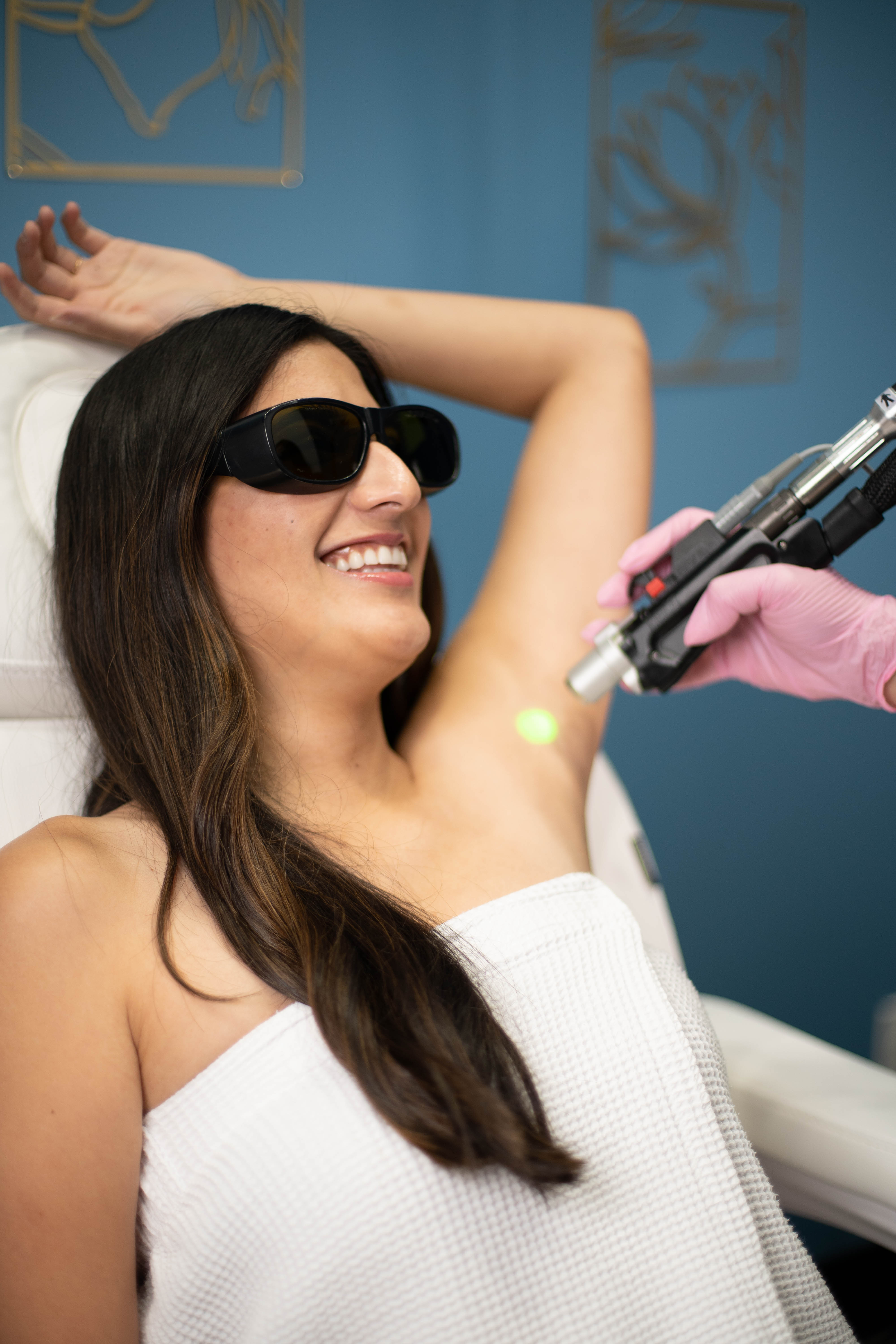
Does Laser Hair Removal Cause Cancer?
Imagine not having to wake up and shave almost every day. Think about how much time and effort that would save and how much better it would feel to always have smooth, hairless skin. It might seem like a dream, but it can be your reality with laser hair removal.
Laser hair removal has gained much popularity in recent years, and for a good reason. Laser hair removal stunts hair growth by destroying hair follicles, leaving you with buttery soft, hairless legs. It’s a permanent procedure that many people swear has changed their lives.
But with that said, laser hair removal is a serious commitment, and you must be positive that it’s the right choice.
If you have been considering getting laser hair removal, your mind is probably flooded with questions, one of which being “does laser hair removal cause cancer?”.
While it’s completely valid to ask this, the outright answer is no, laser hair removal does not cause cancer. In this article, we’ll discuss in more detail how laser hair removal works, possible side effects, and, most importantly, the myth of laser hair removal and cancer.
How does laser hair removal work?
Laser hair removal is a popular cosmetic procedure to stop hair growth. Laser hair removal works by targeting hair at the root using concentrated light and then killing the hair follicle with heat. This process can be done on any desired area of the body, such as your legs, arms, or back.
There are many benefits of laser hair removal, in addition to not having to shave or wax. First, laser hair removal is permanent, so you can say goodbye to having to shave your legs every week. It’s also a fast process and less painful than most other hair removal methods. Laser hair removal can prevent and treat ingrown hairs, and it leaves the skin feeling soft and smooth.
You won’t have to worry about scars or long-term side effects with laser hair removal. Our lasers will not damage the surrounding skin in any way, and all you’ll be left with is hairless baby-soft skin.
Understanding how laser hair removal works is very important before deciding whether it’s right for you. But now you may be wondering about laser hair removal side effects and cancer; we’ll explain why that’s not a concern.
Does laser hair removal cause cancer?
So, can laser hair removal cause cancer?
No, there is no correlation between laser hair removal and cancer. While that question is entirely valid and understandable for someone interested in this procedure, it’s crucial to note that laser hair removal will not cause cancer.
There are many reasons for this, which we’ll elaborate in the section below.
Laser hair removal and cancer: The myth
There is a myth that laser hair removal causes cancer, but it could not be farther from the truth. The myth that laser hair removal causes cancer mainly stems from the fact that laser hair removal uses light energy. When you think of light energy, you think of UV rays. And when you think of UV rays, you think of skin cancer.
However, the light energy used in laser hair removal is not the same as the harmful rays found in sunlight.
Laser hair removal does not involve any UV light, and the wavelengths used for laser hair therapy are longer and less energetic than UV wavelengths, meaning they can’t cause cancer. Laser hair removal will not damage the genetic material of your cells, so there is no known risk of skin cancer from the laser.
UVA and UVB are the two UV wavelengths known to damage skin cells and cause skin cancer, but neither are used in laser hair removal. So while it’s fair to wonder, “can laser hair therapy cause cancer?” The definitive answer is no.
There is no evidence that laser hair removal can cause any type of cancer, so if that’s holding you back, you can go ahead and book your procedure.
What are the possible side effects of laser hair removal?
We know laser hair removal can’t cause cancer, but what about other side effects?
While it is possible to experience side effects from laser hair removal, they are rare and mild, so you shouldn’t necessarily let that deter you from getting it done.
That said, it is still important to be aware of the potential side effects of laser hair removal, which can include:
Skin irritation
While the lasers may cause slight skin irritation at first, it’ll most likely disappear within a few hours of the procedure. The redness and irritation are similar to what you would experience with waxing, and it’s very mild.
In most cases, the person performing the procedure will apply a topical anesthetic prior to treatment to reduce the risk of skin sensitivity. But even so, if you notice slight skin irritation and redness after your procedure, don’t panic. It should go away within a few hours.
Pigmentation changes in the skin
Another potential side effect of laser hair removal is pigmentation changes in the skin. If you notice that your skin is lighter or darker on the affected areas immediately following the procedure, know that this is normal.
While skin pigmentation may seem concerning, it’s actually very common and should disappear quickly. If it doesn’t, you should speak with your laser hair removal provider. There is a risk that hyperpigmentation can occur and have a lasting impact.
Scarring
Something that many people are concerned about with laser hair removal is scarring. Fortunately, scarring is rare with laser hair removal. If you see scars after a procedure, it’s likely due to the practitioner making an error.
For the most part, scars are very unlikely, and you should leave the procedure with soft and scar-free skin with proper care.
However, to further minimize your chances of scarring after laser hair removal, it’s best to avoid sun exposure and topical beauty products that may cause a reaction.
If you experience lasting side effects after laser hair removal, it’s important to consult your laser hair removal provider and seek proper medical care.
How to minimize risks of laser hair removal
Getting laser hair removal is only half of the journey. Aftercare is just as important. It’s crucial to follow your provider’s recommendations for pre- and post-treatment care.
Follow Prep Instructions
Before your treatment sessions even start, your provider should review your medical history and discuss potential risks and expectations so that you have a solid understanding of what to expect.
To prepare for the procedure, they will probably recommend staying out of the sun and avoiding waxing the area or using any lightening treatments. Make sure you shave the area at least 24 hours before your appointment.
Adhere to Aftercare Recommendations
Aftercare depends on where you go and what your practitioner recommends. After your procedure, you should cleanse the area with a gentle soap. Don’t use makeup, lotion, moisturizer, or deodorant on the treatment area for the first 24 hours following the procedure.
About a week after the procedure, exfoliate your skin to speed up hair shedding. Avoid going in direct sunlight for two months after to reduce the chance of pigmentation, and do not pick, thread, or tweeze the area. The whole point of laser hair removal is that it’s a long-term fix, so let your skin be for the best results.
As long as you follow the recommended pre- and post-treatment care, your laser hair removal journey should be smooth sailing, and you’ll have the hair-free, baby-soft skin you’ve always dreamed of.
Be Selective About Your Provider
It’s also important to go to an experienced provider. When undergoing laser hair removal, you want to go to someone who knows how to mitigate risks, has extensive experience operating the laser, and adheres to the highest level of care.
Make sure you research ahead of time and choose someone you can trust. You may get a recommendation, or you can read reviews online. Take the time to look over their website and learn more about their services and standard of care before booking.
Undergo safe, effective laser hair removal
So now that you know the answer to “does laser hair removal cause cancer?” you should feel more confident in whether or not to go through with the procedure.
While it’s crucial to note that laser hair removal does not cause cancer, there are still other factors you’ll want to consider. But if you decide to go through with it, you need to use someone you can trust, like LivSmooth.
LivSmooth prioritizes using safe, effective, and painless lasers to remove hair from the body. Our lasers use the latest technology to remove hair quickly and efficiently. All our laser hair procedures are administered by certified nurse practitioners with extensive industry experience.
We specialize solely in laser hair removal, meaning we’re excellent at what we do. We’re so confident in our exceptional laser services that your treatment is guaranteed for life.
We also offer laser hair removal specials, so that you can take advantage of savings on our procedures. To learn more about us and our services, read over our FAQs.
If you’re tired of shaving constantly, consider laser hair removal. Book a consultation with us today and see how laser hair removal can change your life.













